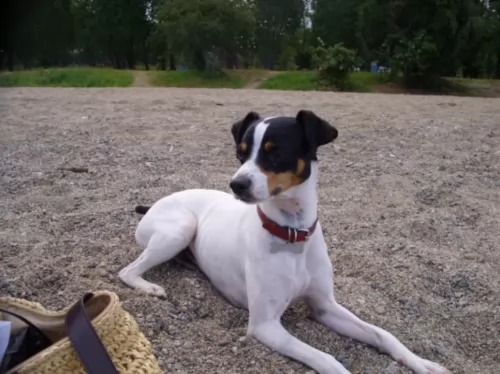 Petzlover
Petzlover Chilean Fox Terrier is originated from Chile but Spanish Mastiff is originated from Spain. Chilean Fox Terrier may grow 48 cm / 18 inches shorter than Spanish Mastiff. Chilean Fox Terrier may weigh 91 kg / 200 pounds lesser than Spanish Mastiff. Chilean Fox Terrier may live 3 years more than Spanish Mastiff. Chilean Fox Terrier may have less litter size than Spanish Mastiff. Both Chilean Fox Terrier and Spanish Mastiff requires Low Maintenance.
Chilean Fox Terrier is originated from Chile but Spanish Mastiff is originated from Spain. Chilean Fox Terrier may grow 48 cm / 18 inches shorter than Spanish Mastiff. Chilean Fox Terrier may weigh 91 kg / 200 pounds lesser than Spanish Mastiff. Chilean Fox Terrier may live 3 years more than Spanish Mastiff. Chilean Fox Terrier may have less litter size than Spanish Mastiff. Both Chilean Fox Terrier and Spanish Mastiff requires Low Maintenance.
 The Chilean Fox Terrier, developed in Chile, is a dog breed which comes from crossing the British Fox Terrier with some of the local Chilean dogs.
The Chilean Fox Terrier, developed in Chile, is a dog breed which comes from crossing the British Fox Terrier with some of the local Chilean dogs.
The dog is thought to have been developed in the 19th century already, some time between 1790 and 1850.
The dog is known for its skills in catching rats and mice. Known also as the Chilean Rat Terrier, Terrier Chileno or Ratonero, the Chilean Fox Terrier hasn’t achieved formal recognition with any of the leading canine organizations.
 The Spanish Mastiff is a giant breed that comes from Spain. He has always been a guardian dog.
The Spanish Mastiff is a giant breed that comes from Spain. He has always been a guardian dog.
He is an ancient dog breed, in fact dating back to medieval times. He has always been a guardian of livestock, protecting them from attacks from wolves and other predators.
The first breed standard of this pure breed dog was made by the FCI in 1946. A breeding program was also formed for this dog In 1981.
 The Chilean Fox Terrier looks almost identical to his ancestors. He stands between 30 – 40cm and weighs between 5 to 9kg.
The Chilean Fox Terrier looks almost identical to his ancestors. He stands between 30 – 40cm and weighs between 5 to 9kg.
He is squarely proportioned, he is athletic looking and well muscled with long, slender legs. Many of these dogs are born with naturally short tails, but if not, then the tail is usually docked after the first or second vertebrae. Now that docking is falling out of favor, the breed is losing that distinctive look.
The head of the Chilean Fox Terrier is triangular with the muzzle being somewhat shorter than the Smooth Fox Terrier. The ears of the Chilean Fox Terrier are smallish and high set, being partially erect. The coat of the dog is short and thick and essentially white while the face is usually tan and black.
The Chilean Fox Terrier is loyal with his human family and can fit in well with a family where there are children and other pets.
Training and socialization become necessary for the dog so that he becomes obedient and amicable around his family and with strangers. He isn’t an aggressive dog but he is alert and can make an excellent watch dog.
He is dominant and confident and also intelligent and easily trainable. He is an active dog so he will require exercise every day, whether he lives in the city or in the country.
 The Spanish Mastiff weighs between 52 and 100kg and the dog’s height is between 72 and 88cm. He has a thick, heavy coat with rustic colors of fawn, black, grey, reddish and yellow as well as brindle.
The Spanish Mastiff weighs between 52 and 100kg and the dog’s height is between 72 and 88cm. He has a thick, heavy coat with rustic colors of fawn, black, grey, reddish and yellow as well as brindle.
He is powerful and muscular with a huge head. The ears are medium length and floppy and the tail is long. If you were looking for a puppy, the American Kennel Club is the only site which has 100% puppies from AKC-Registered litters.
Large, kind, gentle and intelligent, the Spanish Mastiff is well balanced. When you see him you won’t find a dog that is light on his feet and who jumps around excitedly. He is a dignified, intelligent dog, quiet and calm.
Even though he is so calm, it is still a good idea to have him trained and socialized as his very size could be a problem. When you tell him to lie down, you want him to listen to you. This big, gentle giant is devoted to his human family ad takes the role of guardian and protector seriously.
He isn’t suited to life in the city but is better suited to a large property, also because he has a loud bark.
 The Chilean Fox Terrier is a lively dog with an alert expression. He has become a popular companion dog, being less aggressive than other Terriers.
The Chilean Fox Terrier is a lively dog with an alert expression. He has become a popular companion dog, being less aggressive than other Terriers.
When you treat him well he becomes a loyal friend and forms a strong bond with his human owners. He gets on well with children who have been taught to respect animals, but he tends to become a bit aggressive around other dogs of the same sex.
Socialization and training however can make him much more relaxed around other dogs.
He is an attractive little dog with his short coat, giving the appearance of being well groomed. He can adapt to country- or city life too. He is such an easy dog to keep too so why not choose him as your 4-legged family member? He promises to make the perfect family companion.
 Kind, gentle, quietly confident and intelligent are just some of the wonderful characteristics of the Spanish Mastiff.
Kind, gentle, quietly confident and intelligent are just some of the wonderful characteristics of the Spanish Mastiff.
You can add loyalty and devotion to these characteristics too and the fact that he wants to protect you.
Your gentle giant is guaranteed to make you the most wonderful companion and he deserves the very best treatment there is.
 The Chilean Fox Terrier is a healthy breed who doesn’t appear to have any particular health issues. It doesn’t mean that your dog will be free from disease, but it is worth knowing that a quality diet, fresh water and lots of love and attention does enhance longevity in a pet.
The Chilean Fox Terrier is a healthy breed who doesn’t appear to have any particular health issues. It doesn’t mean that your dog will be free from disease, but it is worth knowing that a quality diet, fresh water and lots of love and attention does enhance longevity in a pet.
It is to your benefit to know about one or two common diseases that your dog could get.
You’ll notice your pet’s stomach being swollen. Bloat is a disease which can become dangerous because the stomach can twist. Once this happens, gas can’t escape from the stomach and your pet will want to vomit, he’ll salivate and you’ll notice unusual restless kind of behavior. You need to get him to the vet as soon as possible.
This is also a disease that any dog can develop and can be a complication of another pet disease such as Lyme disease. One of the first signs of kidney disease in dogs is drinking more often than usual and also urinating more often.
He’ll lose his appetite and be lethargic and likely lose weight. Kidney disease is a serious disease and you will need to get your pet to the vet as soon as possible.
 It is good to be wise about some of the common dog problems there are that could plague your Spanish Mastiff. Vets are very familiar with these dog illnesses and they tailor their treatment to suit the needs of your dog.
It is good to be wise about some of the common dog problems there are that could plague your Spanish Mastiff. Vets are very familiar with these dog illnesses and they tailor their treatment to suit the needs of your dog.
Remember to get your pet vaccinated against the terrible diseases you get that can kill a dog – rabies, parvo and distemper.
People often think that obesity is something that isn’t dangerous, when in fact it is a serious disease that can cause joint problems, digestive disorders, heart disease, back pain and hip dysplasia.
Dogs rely on water just like what humans do to keep them healthy and functioning properly.
Water is critically important to every organ and also assists with digestion. Your dog is panting and urinating throughout the day and needs to replace the liquid he loses.
Dehydration in dogs results in loss of electrolytes, such as sodium, chloride, and potassium.This is bad as these minerals have important functions.
A dog that is dehydrated has loss of appetite, loss of skin elasticity, is lethargic, has sunken eyes, wants to vomit, has a dry nose and thick saliva. No dog should ever be left without a constant supply of fresh, cool water day and night.
 The Chilean Fox Terrier is a low maintenance breed and this means you won’t be having to part with any money on grooming sessions for him. He’ll basically require a brushing twice a week.
The Chilean Fox Terrier is a low maintenance breed and this means you won’t be having to part with any money on grooming sessions for him. He’ll basically require a brushing twice a week.
The Chilean Fox Terrier, as a smaller dog breed, will also require regular dental brushing, as neglecting this can result in dental problems as well as a host of diseases that are associated with gum disease and tooth decay.
Make sure to feed him a quality diet full of vitamins and minerals and ensure he always has fresh, cool water available.
 These are giant breed dogs, so you have to be careful with the way you feed them. Large dogs like these are prone to hip dysplasia so you need to choose a food which has ingredients that work to prevent this disease.
These are giant breed dogs, so you have to be careful with the way you feed them. Large dogs like these are prone to hip dysplasia so you need to choose a food which has ingredients that work to prevent this disease.
You have to be very careful that you don’t overfeed your dog so that the extra weight puts strain on the joints.
This dog will do well with some raw meat added into his diet. Also, include home-made food too. Boiled chicken, brown rice or pasta, sweet potatoes, carrots and spinach chopped up and added to his dry kibble for giant breeds. Added in twice a week can do him the world of good.
A good bush of the thick coat twice a week will keep the Spanish Mastiff looking his best.
The nails will also need to be trimmed regularly to avoid overgrowth and to avoid the nails catching onto things. The ears too should be checked regularly to avoid dampness inside the ear which can cause bacteria.
As a fully grown adult, the Spanish Mastiff isn’t a frisky, frolicking dog but he will still require daily exercise. Options for exercise include long walks, hikes, swimming and ball games.